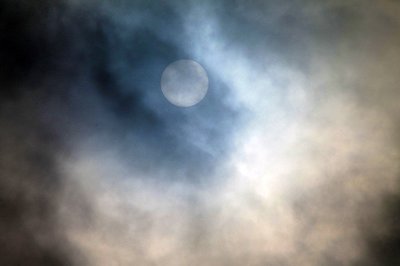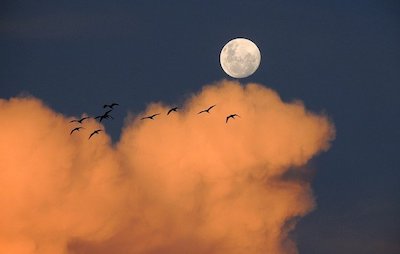I got to see the moon today. The winter has been cloudy, and I was looking forward to an evening walk under a rising and nearly full moon, but when I went out, the eastern sky was full of clouds. I had some hope that the sky might clear, though, and a mile or so into my walk I did spot a very ghostly moon, just barely visible through the clouds.

A little further on, I saw it again, slightly more substantial but tangled in the branches of a tree. From where I stood, only a small strip of sky was visible between the tree and a house, and I walked very slowly until I found just the spot at which I could see the moon unobscured by either tree or house. It was silly, perhaps; to me it felt like part of an ongoing game.
When I was very small, my mother would push me in a swing in a park near our house. As I swung, I noticed the moon bobbing up and down, sometimes disappearing briefly behind a tree. My mother would sing this song:
I see the moon,
the moon sees me,
hiding behind
the backyard tree.
Because of the way the moon disappeared and reappeared, not only when I was swinging but as we walked to and from the park, I thought as a child that it was the moon that hid behind the backyard tree. But at some point I recognized the ambiguity of the lines and realized it could be me, playing a game with the moon. Or maybe we were playing a game with each other.
I hadn’t understood clearly until tonight that those long-ago evenings are still with me in my love of the night sky. The child is mother of the woman, to paraphrase Wordsworth. I love to walk at dusk, when I can watch the stars come out and see the moon, if it’s up then. Sometimes I stop to admire it, storing countless mental snapshots of the moon in gaps between tree branches, or sitting between two power lines like a whole note on a musical staff.

I have so many memories of the moon: very slender crescents, either really old or really new, sometimes with a bright planet close by; full moons that seemed to float gently free of the horizon and sail on into the night; serenely shining moons seen intermittently between ragged flying clouds; the daytime moon, pale and unfamiliar; a full moon rising over the Atlantic, edging each wave with liquid silver.
Seeing the moon today and recalling my mother’s song reminded me of something I read recently, a translation of part of Rilke’s “Archaic Torso of Apollo”: “For here, there is no place that does not look back.” Jane Hirshfield quotes this line in her book Nine Gates: Entering the Mind of Poetry. She goes on to say, “In this radical vision of vision, there is no difference between human and nonhuman, between sentient and nonsentient. All being becomes single, alive, available, and awake.”
That idea is deeply attractive to me, and I’m trying to understand what it might mean. It calls to mind the poem “Oh, Lovely Rock” by Robinson Jeffers. In this poem, he describes a camping trip on which, late at night, by the light of a campfire, he sees rock as if for the first time, sees “the real and bodily and living rock.”
Jeffers describes the rock in human terms (“the silent passion, the deep nobility and childlike loveliness … It is here in the mountains like a grave smiling child”), but he also recognizes its non-humanness, its fate “going on outside our fates.” He recognizes that the rock will still be there centuries later, long after he is gone and the human world has moved through many changes: “the energies that are its atoms will still be bearing the whole mountain above.”
I think this poem may illustrate what I’m grappling with when I think about the moon looking back at me. I don’t want to simply pull the moon into the sphere of the human (and from the context of his other work, I’m sure that’s not what Jeffers was trying to do with the mountainside he saw). I don’t want to view all of nature as single and alive and awake by seeing it as sentient or human-like. I want to share a gaze with nonhuman, nonsentient nature. The experience must lie beyond words, and I know I shouldn’t try too hard to articulate it. Being a writer, though, I make the effort to use words to point and gesture.
###
The Rilke translation is that of Stephen Mitchell.
First image (moon behind clouds) by kalhh from Pixabay
Second image (moon, cloud, birds) by Junior Peres Junior from Pixabay